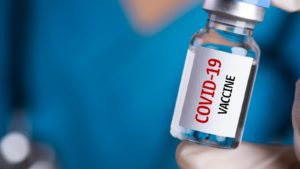COVID-19 vaccine is free, and doesn’t cause impotence – GHS
 Dr Kwame Amponsa-Achiano, the Programme Manager, Expanded Programme on Immunization, Ghana Health Service, says the Oxford AstraZeneca COVID-19 vaccine being deployed to protect Ghanaians of the virus does not cause impotence.
Dr Kwame Amponsa-Achiano, the Programme Manager, Expanded Programme on Immunization, Ghana Health Service, says the Oxford AstraZeneca COVID-19 vaccine being deployed to protect Ghanaians of the virus does not cause impotence.
He said it was also going to be free of cost for everyone and therefore, asked the public to ignore the myths surrounding how costly the vaccine would be as well as the misperception that it caused impotence among men and infertility among women.
He made the clarification at a seminar organised in Accra by the Ghana Registered Nurses and Midwives Association (GRNMA) on Friday, on the topic, “COVID Vaccine Rollout in Ghana: The Role of the Nurse and Midwife”.
Dr Amponsa-Achiano said the vaccine had been well examined by the Food and Drugs Authority and the Ghana Health Service and was completely harmless.
He said the vaccine would rather among other advantages, contribute to the reduction in COVID-19 ill-health and deaths, enhance mental and psychosocial wellbeing of all and facilitate smooth relationship between Ghana and the globe.
Speaking about the Country’s choice of vaccine among many others, the Programme Manager said the AstraZeneca was safe, had efficacy and potential effectiveness formation, was easy to store, feasible, available and had regulatory approval.
On many events that the vaccine had been tested, he said adverse effects recorded were the usual mild effects of vaccines like rise in temperature, fatigue, muscle and joint pains, and headaches.
However, he said they lasted for only a short while and beneficiaries recovered.
Dr Amponsa-Achiano said the nationwide COVID-19 vaccination exercise which will kick-off on March 2, 2021, with 600,000 vaccines will start with persons most at risk until the nation procured at least 20 million to cover a significant percentage of the entire citizenry.
Dr Patrick Kuma-Aboagye, the Director-General of the Ghana Health Service, said 3,556 health workers including; Nurses and Midwives had contracted the COVID-19 out of which 14 lost their lives.
He said it was, therefore, important that health workers, including; Nurses and Midwives warmly embraced the vaccine to reduce hospitalisation, severe disease and death, and transmissions.
He explained that there were three approaches to the deployment of the vaccine, based on the most at risk.
They were health workers, essential service providers and arms of government, and the vulnerable and public especially the COVID-19 hotspot areas.
However, Dr Kuma-Aboagye said the segmentation of the most at risk was not a prioritization and anybody who required the necessary attention would be prioritised.
He advised health workers to be worthy advocates of the good virtues of the vaccine to demystify the myths and misconceptions surrounding it.
“If you feel somebody has made this vaccine to kill you, that same person has made cars and foods for you to import or purchase, so if you die, who will go and buy them,” he said.
Mrs Perpetual Ofori-Ampofo, the President, GRNMA, said about 800 members of the GRNMA had contracted the second wave of the COVID-19 and some were on treatment or isolation while others had been discharged.
She said health workers knew that deployment of vaccines into the country was not new, therefore, it was sometimes troubling whenever they heard people especially health workers saying they were not ready to have the vaccines.
She urged the government to strengthen its efforts in securing more vaccines for majority or all of the population.
Mrs Ofori-Ampofo urged the government to ensure that pharmaceutical companies in the near future did not acquire monopoly over preventive and treatment medications that were related to COVID-19.
“The GRNMA supports the vaccination programme and I urge all Nurses and Midwives to allow themselves to be vaccinated when it is time,” she advised.
Source: GNA
